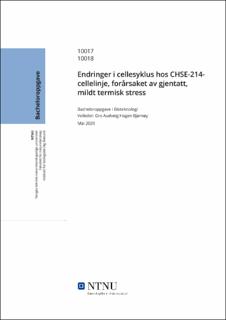Endringer i cellesyklus hos CHSE-214-cellelinje, forårsaket av gjentatt, mildt termisk stress
Abstract
Kunnskap om hvordan gjentatt mildt termisk stress, i form av økte vanntemperaturer, påvirker fisk, er viktig for å forstå potensielle endringer i deres habitat og nedgang i bestander. Det vil videre gi en forståelse for de konsekvenser dette kan ha for fiskerinæringen. Cellelinjen CHSE-214 ble brukt for å studere endringer i stressresponsen, mer spesifikt endringer i cellesyklus, hos celler utsatt for gjentatt mildt termisk stress.
Cellene ble utsatt for termisk stress ved 26 °C i intervaller på to timer. Stressintervallene ble gjentatt én til fire ganger. Mellom stressintervallene fikk cellene hvile i 24 timer ved 20 °C. Stressutsatte celler ble sammenlignet med en kontroll, celler inkubert ved 20 °C.
Analyse av cellesyklus ble gjort ved hjelp av et flowcytometer hvor prosentandel celler i G1/G0-, S- og G2/M-fasen ble bestemt. Det var minimale differanser mellom kontroll og stressforsøkene, noe som indikerer at opp til fire stressintervaller med mildt termisk stress ikke påvirker cellene. Knowledge about the effect thermal stress has on fish, in the form of increased water temperatures, is important in the understanding of potential changes in habitats and declines in populations. This will further provide an understanding of the consequences for fisheries. The cell line CHSE-214 was used to study changes in the stress response, more specifically changes in the cell cycle in cells exposed to repeated, mild thermal stress.
The cells were exposed to thermal stress at 26 °C in two-hour intervals. The stress intervals were repeated one to four times. Between the stress intervals the cells recovered for 24 hours at 20 °C. The stress exposed cells were compared to a control, cells incubated at 20 °C.
Analysis of the cell cycle was done with the help of a flow cytometer where the percentage of cells in G1/G0-, S- and G2/M-phase was determined. There was a minimal difference between the control and the stress-exposed cells, which indicated that up to four stress intervals of mild thermal stress does not affect the cells.
